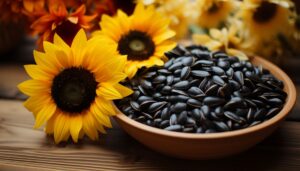
Ukrainian farmers expanded their sunflower production area by 3.3% in the 2025-2026 marketing year (MY) compared to the 2024-2025 MY, given its attractive prices in the past poor harvest year, and the harvest will be 3% higher, according to forecasts by the industry analytical agency UkrAgroConsult.
The agency expects that the sunflower harvest forecast for 2025/26 MY will be 3% higher than last year, given that the sunflower market is the “grayest” among other oilseeds.
“Currently, harvest statistics show low yields. Expectations that the northward and westward progress of the harvest will significantly increase yields have not been confirmed. Yields are increasing but remain quite low,” experts explained.
They recalled that in 2024/25 MY, the sunflower harvest was 20% lower than in 2023/24 MY and at the same time became the lowest since 2016/17 MY. At the same time, the sown area was reduced by 2%, and the yield by 18%.
The share of domestic processing of the harvest in 2024/25 MY remained high at 97% due to the cessation of active outflow of raw materials for export, while sunflower oil exports became minimal since 2026/17 MY (-24% compared to 2023/24 MY). Almost the entire season was marked by farmers’ restraint in selling sunflower seeds. Accordingly, sunflower meal exports were also minimal over the last three seasons (-27% compared to 2023/24 MY).
“In general, the 2024/25 marketing year can be characterized as a crisis, which led to a balance between limited resources and the desire to maintain Ukraine’s position in the global market for sunflower processing products,” UkrAgroConsult stated.
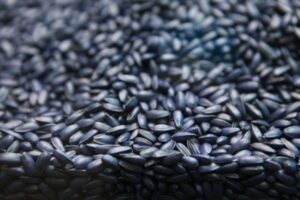
Sunflower processing in Argentina in August 2025 increased to 488 thousand tons compared to 330 thousand tons in the same month of 2024, according to the APK-Inform agency, citing data from Oil World. At the same time, the figure was only slightly lower than in July of this year (491,000 tons).
According to experts, processing in September and October will continue to significantly exceed last year’s figures, as Argentine processors are taking advantage of the decline in sunflower harvests in Ukraine, Russia, Turkey, and Bulgaria.
Argentine sunflower oil is currently the most competitive on the world market and is sold at significant discounts compared to products from the Black Sea region. Thus, exports in August amounted to 172,000 tons, compared to 116,000 tons a year earlier. The main destinations are India (90,000 tons compared to 21,000 tons a year earlier) and Iraq (14,000 tons compared to 31,000 tons).
According to data from the Argentine Ministry of Agriculture, the sunflower harvest in 2025 exceeded forecasts and amounted to 5.3 million tons, compared to 3.9 million tons in 2024. The country’s authorities expect to maintain high production levels in 2026 by increasing the area under cultivation by 10% annually.
Analysts at the Experts Club note that the growth in processing and exports from Argentina is putting pressure on the global sunflower oil market, lowering prices and increasing competition.
For Ukraine, one of the world’s largest producers and exporters of oil, this could mean a reduction in export revenues and the need to actively seek new markets, as well as to focus on deeper processing and improving product quality.
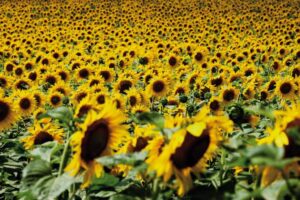
Consulting agency UkrAgroConsult forecasts a 5.7% decline in sunflower harvest in the 2025 season to 13.3 million tons from 14.1 million tons in the previous forecast due to drought in southern and eastern Ukraine, the agency’s press service reported.
“Crop losses are mainly observed in the southern and eastern regions, where drought has significantly affected crops. In contrast, the situation is more favorable in the northern and western regions, where rains have been regular. Sunflower yields are expected to increase during harvesting in the northwestern belt, as was the case with wheat and barley,” the agency said.
Analysts added that market estimates of the sunflower harvest range from 12.8 to 13.5 million tons. Therefore, UkrAgroConsult sticks to the upper end of the estimate due to the expansion of acreage in the west and north after the start of the war. However, seed quality is a concern due to diseases caused by rains during harvesting in these regions.
UkrAgroConsult has more optimistic forecasts for corn.
“The main growing regions have sufficient moisture levels, and crops in the south account for a small share. This year’s pollination and grain filling period coincided with more favorable temperatures compared to last year, and periodic rains contributed to crop development,” experts said.
Market estimates of the corn harvest range from 28 million tons to 35 million tons, but at the end of July, UkrAgroConsult raised its forecast by 2 million tons to 32.5 million tons, or 6.6%, which is one of the highest figures on the market.
UkrAgroConsult’s wheat harvest forecast remains stable at 22 million tons. As of August 7, almost 15 million tons had been harvested from 74% of the planted area. The remaining 26% is in regions with the highest yields, which gives grounds for optimism, the agency concluded.
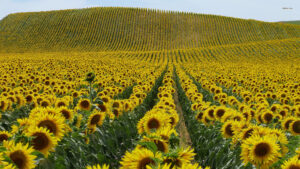
Sunflower production in Ukraine in 2025 will not exceed 13.6-13.7 million tons, which is only 7% higher than in 2024, according to the information and analytical agency APK-Inform.
Analysts noted that weather conditions continue to reduce the yield potential of sunflower in Ukraine, particularly in the south and east of the country, where up to 50% of the total area under this oilseed crop is concentrated. Cool weather in the spring and critically low soil moisture reserves in these regions, combined with insufficient rainfall, have created unfavorable conditions for the development of oilseed crops.
According to their information, a number of farmers report that crops are in very poor condition: uneven plant growth in the field, delayed vegetation, small heads, as a result of which decisions are being made to disc these fields and prepare for winter sowing. In a number of regions, crops suffered from high temperatures in July, and hail was also reported locally.
Experts noted that crop losses in the south and east may be offset by expected better sunflower yields in the center, as well as in the west and north, where temperatures and precipitation were more favorable.
They are convinced that a significant increase in the cost of sunflower seeds in the new season should not be expected.
“First, many factories are changing their operating strategies to avoid losses and negative margins, as in the 2024/2025 season. Second, the low cost of sunflower oil, whose trade slowed in the 2024/2025 season due to lower production. Thirdly, plants will now have an advantage in the form of export duties on soybeans and rapeseed, which may contribute to an increase in the supply of oilseeds on the domestic market,” APK-Inform concluded.
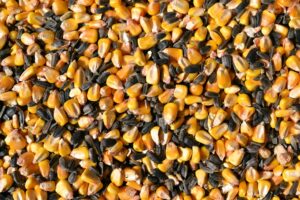
The sales rates in the season-2024 were significantly higher compared to the previous year, especially for corn and sunflower, Agrohub reported based on the results of two waves of research on the efficiency and effectiveness of growing the main crops of the season-2024.
“At the time of the first wave of the study (end of January 2025), the percentage of sales of these crops was more than 60%, while at the end of January 2024, only 25% of corn and 27% of sunflower were sold,” the researchers said.
According to the study, sunflower was sold almost completely, which was due to a decrease in its share in the crop structure and high demand from the processing industry, as well as an increase in the number of oil extraction plants. For export-oriented crops, a stable sea export corridor plays an important role in shaping the sales rate: despite the threats and shelling of port infrastructure, it remained the most effective channel for selling products, analysts say.
The positive price situation was the main factor behind the growth of profitability of agricultural production in 2024, the report says. Thus, the break-even point decreased in many crops, while the profitability indicators increased. According to the results of the season-2024, the average forecast EBITDA for such crops as winter wheat, rapeseed and barley, as well as sunflower and corn amounted to $402 per 1 ha, which exceeded last year’s forecast level of $94 per 1 ha, i.e. 4.3 times, Agrohub calculated.
The analysts reminded that the forecast EBITDA is an expected estimate of profitability per hectare, calculated on the basis of current selling prices of already sold products and forecast prices for the residues.
Experts identify sunflower, corn, and rapeseed as the crops with the highest expected profitability in the 2025 season.
Despite the fact that in the 2024 season the yields of the studied crops decreased, the positive price dynamics during the year allowed not only to maintain but also to increase the profitability of crops. The main reason for the decrease in yields was drought and heat in the central, southern and eastern regions. Soil temperatures in summer reached above +60°C, and local rains failed to save the situation. In the West, where there is traditionally more rainfall, the yield decline was not significant, the researchers emphasized.
In addition, analysts drew attention to an interesting trend in the dynamics of costs, which has been observed for two seasons in a row. In particular, the costs of growing decreased slightly – within 8% for sunflower and rapeseed, mainly due to the reduction of fertilizer costs. At the same time, crop protection costs for sunflower and corn decreased by 11% due to dry weather conditions. Lower yields per hectare and dry weather conditions resulted in lower costs for transportation and grain processing, as the average moisture content of harvested corn in the 2024 season was 16.7% compared to 19.8% a year ago.
“The 2024 season illustrated how the agricultural business in Ukraine is learning to adapt to complex challenges: from war and unstable logistics to climate change and lack of resources. Increasing profitability and efficiency in such conditions is the result of flexibility, strategic planning and proper agricultural practices,” Oksana Bobrova, Head of Agrohub Benchmarking, summarized in her statement.
The study of the first and second waves of efficiency and effectiveness indicators of the main crops of the 2024 season, conducted by Agrohub, involved 14 largest Ukrainian agricultural holdings. The total area of analysis covered 1.7 million hectares in eight macro-regions of Ukraine.
The data on crop sales in the 2024 season are based on Agrohub’s research conducted in January-May 2025 among 83 field companies with a total area of 1.7 mln ha. The area of the studied crops: sunflower – 302.5 thou hectares, corn – 363.4 thou hectares, soybeans – 411.2 thou hectares, winter wheat – 403.5 thou hectares, winter rapeseed – 169.5 thou hectares and winter barley – 18 thou hectares.
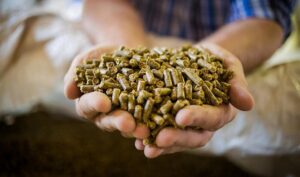
According to the results of September-May 2024-2025 marketing year, Ukraine exported 2.68 million tons of sunflower meal, which is 29% less than in the same period of the 2023/2024 season and the lowest volume since the 2011/2012 marketing year, according to the information and analytical agency APK-Inform.
Analysts noted that about 49% of total Ukrainian meal exports went to the EU and another 35% to China.
“A total of 1.3 million tons were exported to the EU in the first nine months of the current season, which is 22% less than in the same period last season. Ukrainian products account for 63% of the EU’s total imports of this meal (43% in the previous season), but in addition to fierce competition from soybean meal, they are also being squeezed by Argentine sunflower meal, whose share has grown to 28% (20% in the previous marketing year),” the experts explained.
According to their information, exports of Ukrainian sunflower meal to China during the same period decreased by 25% and amounted to 944 thousand tons. On the Chinese market, Ukrainian products account for about 60% of total imports in September-April of the current season (71% in September-April of the 2023/24 season). Russian meal accounted for up to 27% of total imports during the same period, compared to 9% in the previous marketing year.
At the same time, shipments of sunflower meal from Kazakhstan to China increased almost fivefold, and its share in China’s imports is about 5%, APK-Inform summarized.